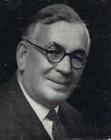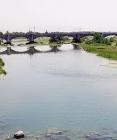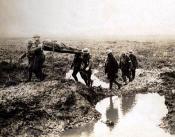I went across to France again, and walked about the line,
The trenches have been all filled in - the country's looking fine.
The folks gave me a welcome, and lots to eat and drink,
Saying, 'Allo, Tommee, back again? 'Ow do you do? In ze pink?'
And then I walked about again, and mooched about the line;
You'd never think there'd been a war, the country's looking fine.
But the one thing that amazed me most shocked me, I should say
- There's buses running now from Bethune to La Bassée!
I sat at Shrapnel Corner and I tried to take it in,
It all seemed much too quiet, I missed the war-time din.
I felt inclined to bob down quick - Jerry sniper in that trench!
A minnie coming over! God, what a hellish stench!
Then I pulled myself together, and walked on to La Folette -
And the cows were calmly grazing on the front line parapet.
And the kids were playing marbles by the old Estaminet -
Fancy kiddies playing marbles on the road to La Bassée!
You'd never think there'd been a war, the country's looking fine -
I had a job in places picking out the old front line.
You'd never think there'd been a war - ah, yet you would, I know,
You can't forget those rows of headstones every mile or so.
But down by Tunnel Trench I saw a sight that made me start,
For there, at Tourbieres crossroads - a gaudy ice-cream cart!
It was hot, and I was dusty, but somehow I couldn't stay -
Ices didn't seem quite decent on the road to La Bassée.
Some of the sights seemed more than strange as I kept marching on.
The Somme's a blooming garden, and there are roses in Peronne.
The sight of dear old Arras almost made me give three cheers;
And there's kiddies now in Plugstreet, and mamselles in Armentiers.
But nothing that I saw out there so seemed to beat the band
As those buses running smoothly over what was No Man's Land.
You'd just as soon expect them from the Bank to Mandalay
As to see those buses running from Bethune to La Bassée.
Then I got into a bus myself, and rode for all the way,
Yes, I rode inside a bus from Bethune to La Bassée.
Through Beuvry and through Annequin, and then by Cambrin Tower -
The journey used to take four years, but now it's half an hour.
Four years to half an hour - the best speedup I've met.
Four years? Aye, longer still for some - they haven't got there yet.
Then up came the conductor chap, 'Vos billets s'il vous plait.'
Fancy asking for your tickets on the road to La Bassée.
And I wondered what they'd think of it - those mates of mine who died -
They never got to La Bassée, though God knows how they tried.
I thought back to the moments when their number came around,
And now those buses rattling over sacred, holy ground,
Yes, I wondered what they'd think of it, those mates of mine who died.
Of those buses rattling over the old pave close beside.
'Carry on! That's why we died!' I could almost hear them say,
To keep those buses always running from Bethune to La Bassée!'
The trenches have been all filled in - the country's looking fine.
The folks gave me a welcome, and lots to eat and drink,
Saying, 'Allo, Tommee, back again? 'Ow do you do? In ze pink?'
And then I walked about again, and mooched about the line;
You'd never think there'd been a war, the country's looking fine.
But the one thing that amazed me most shocked me, I should say
- There's buses running now from Bethune to La Bassée!
I sat at Shrapnel Corner and I tried to take it in,
It all seemed much too quiet, I missed the war-time din.
I felt inclined to bob down quick - Jerry sniper in that trench!
A minnie coming over! God, what a hellish stench!
Then I pulled myself together, and walked on to La Folette -
And the cows were calmly grazing on the front line parapet.
And the kids were playing marbles by the old Estaminet -
Fancy kiddies playing marbles on the road to La Bassée!
You'd never think there'd been a war, the country's looking fine -
I had a job in places picking out the old front line.
You'd never think there'd been a war - ah, yet you would, I know,
You can't forget those rows of headstones every mile or so.
But down by Tunnel Trench I saw a sight that made me start,
For there, at Tourbieres crossroads - a gaudy ice-cream cart!
It was hot, and I was dusty, but somehow I couldn't stay -
Ices didn't seem quite decent on the road to La Bassée.
Some of the sights seemed more than strange as I kept marching on.
The Somme's a blooming garden, and there are roses in Peronne.
The sight of dear old Arras almost made me give three cheers;
And there's kiddies now in Plugstreet, and mamselles in Armentiers.
But nothing that I saw out there so seemed to beat the band
As those buses running smoothly over what was No Man's Land.
You'd just as soon expect them from the Bank to Mandalay
As to see those buses running from Bethune to La Bassée.
Then I got into a bus myself, and rode for all the way,
Yes, I rode inside a bus from Bethune to La Bassée.
Through Beuvry and through Annequin, and then by Cambrin Tower -
The journey used to take four years, but now it's half an hour.
Four years to half an hour - the best speedup I've met.
Four years? Aye, longer still for some - they haven't got there yet.
Then up came the conductor chap, 'Vos billets s'il vous plait.'
Fancy asking for your tickets on the road to La Bassée.
And I wondered what they'd think of it - those mates of mine who died -
They never got to La Bassée, though God knows how they tried.
I thought back to the moments when their number came around,
And now those buses rattling over sacred, holy ground,
Yes, I wondered what they'd think of it, those mates of mine who died.
Of those buses rattling over the old pave close beside.
'Carry on! That's why we died!' I could almost hear them say,
To keep those buses always running from Bethune to La Bassée!'
envoyé par Bernart Bartleby - 4/1/2016 - 01:23
×
![]()






Monologo musicale scritto da Bernard Newman ed Harold Arpthorp
Testo trovato su Music Hall Lyrics
Lo scrittore inglese Bernard Newman combattè nelle trincee francesi durante la Grande Guerra. Nei primi anni 30, lui ed il suo amico ed ex commilitone Harold Arpthorp tornarono nei luoghi in cui avevano combattuto - in particolare a La Bassée, una cittadina del Nord-Pas-de-Calais di cui nel 1918 non era rimasta pietra su pietra - ma li trovarono molto cambiati, a poco meno di 15 anni dalla fine della guerra. Un’atmosfera bucolica e tranquilla che strideva coi ricordi di morte ancora freschi dei due reduci. Eppure era quella la vita mentre era al guerra ad essere innaturale ed assurda: ebbene sì, tanti di loro erano morti solo pewrchè i pullman potessero fare la loro corsa da Béthune a La Bassée...
Il monologo, adattato musicalmente per un racconto teatrale, fu certamente ispirato agli autori dalla poesia “La Bassée Road”, composta nel 1915 da un giovane combattente, Patrick MacGill (1889–1963), poeta, giornalista e scrittore irlandese. Nonostante sia inclusa nella raccolta “Patriotic pieces from the Great War” (1918), non mi pare che il testo della poesia sia molto patriottico: anche qui la descrizione della vita agricola di quei luoghi, in armonia con la Natura, contrasta in modo stridente con l’immagine del passaggio di un plotone di soldati laceri e stanchi che tornano dalla prima linea, nei cui pressi riposano, sepolti alla bell’e meglio, molti dei loro compagni...
(Givenchy, 1915)
You'll see from the La Bassée Road, on any summer's day,
The children herding nanny-goats, the women making hay.
You'll see the soldiers, khaki clad, in column and platoon,
Come swinging up La Bassée Road from billets in Bethune.
There's hay to save and corn to cut, but harder work by far
Awaits the soldier boys who reap the harvest fields of war.
You'll see them swinging up the road where women work at hay,
The straight long road,—La Bassée Road,—on any summer day.
The night-breeze sweeps La Bassée Road, the night-dews wet the hay,
The boys are coming back again, a straggling crowd are they.
The column's lines are broken, there are gaps in the platoon,
They'll not need many billets, now, for soldiers in Bethune,
For many boys, good lusty boys, who marched away so fine,
Have now got little homes of clay beside the firing line.
Good luck to them, God speed to them, the boys who march away,
A-swinging up La Bassée Road each sunny summer day.
Il testo di Newman ed Arpthorp è comunque ben più cinico della sua ispirazione.